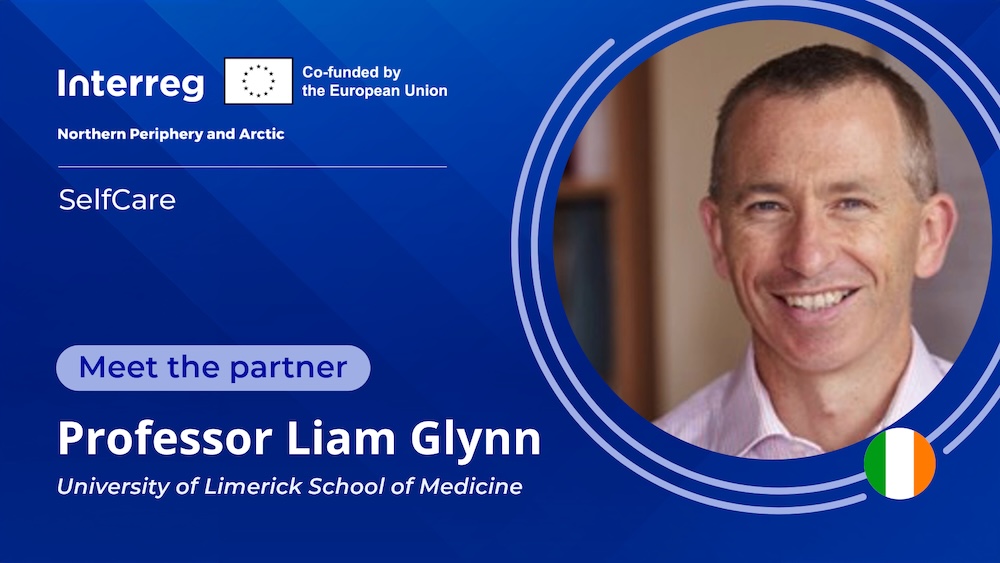Meet the partner: Prof. Liam Glynn
Get to know Professor Liam Glynn and University of Limerick School of Medicine in Ireland, our Project Partner Principal Investigator.

About Professor Liam Glynn
Prof Liam Glynn is a rural GP in Ballyvaughan in Co Clare for the last 25 years, founding chair of the North Clare Primary Care Team and the Professor of General Practice at the School of Medicine, University of Limerick. In 2015, along with other Rural GPs, he co-founded the “No Doctor No Village” advocacy campaign and remains an active advocate for Rural General Practice, most recently as chair of the organising committee of the Rural WONCA Conference in Limerick in 2022 and as the newly appointed chair of the ICGP Standing committee for Rural General Practice. His primary research interests are in preventive medicine with a focus on physical activity and on bringing technological solutions to healthcare particularly for rural communities. He is a Fellow of the Royal College of General Practitioners, the Royal College of Surgeons of Ireland and the Faculty of Sports and Exercise Medicine. He has over 250 publications and has written 7 book chapters, the most recent on Irish Rural General Practice as part of the second edition of the textbook “Rural Healthcare” published by the RCGP Rural forum.
About University of Limerick School of Medicine
The University of Limerick School of Medicine aims to be a world class medical school delivering leading edge education and research programmes that positively impact the health and well-being of our global community. Through an inclusive, collaborative and supportive culture we deliver inspiring and distinctive education and research programmes of the highest quality, producing outstanding, internationally recognised graduates and leaders in Medicine and Health, enhancing healthcare and its delivery to patients and communities particularly in our rural hinterland in the West of Ireland.
How UL contributes to the NPA SelfCare project
The number of refugees fleeing the war in Ukraine and resident in Ireland is now approaching 110,000, according to latest data published by the Central Statistics Office (CSO). The Irish team involved in the NPA SelfCare project are responsible for the healthcare delivery to a highly disperse population of rural communities in the North Clare region of the West of Ireland. The census population of this area currently stands at approximately 9,000 individuals, 1,000 of which are Ukrainians fleeing the conflict in Ukraine. This has presented significant challenges to primary healthcare capacity in this rural healthcare region and significant challenges to the refugees as individuals in terms of accessing healthcare, as the first point of contact for healthcare access in the Irish system is primary care. The aim of this project is to develop an intervention which will facilitate healthcare access for the large refugee population residing in this rural region. The challenges to access are multifaceted and include, but are not limited to, language, healthcare capacity, transport, financial and system structure. The potential gains of the project will be to alleviate healthcare capacity challenges through delivering the right care to the right individual at the right time in the right place. In terms of the refugee population itself, developing a culturally appropriate service that is understandable, manageable, and has a focus on self-care is crucial in order to increase levels of trust, understanding and confidence in the healthcare system.
Why this partnership matters
The collaboration between UL and NPA SelfCare strengthens the project as it clearly recognises the common thread of marginalisation, disconnection, disempowerment and low levels of trust and understanding that define our target groups: 1) Ukrainian refugees who have arrived in Ireland since the beginning of the conflict; 2) The Sami population following migrating reindeer herds inside the Arctic Circle; 3) The older adult population living independently in remote, rural and isolated Icelandic island and remote communities who need to travel to access healthcare services. The health and well-being of these communities is dependent on the ability to access culturally sensitive healthcare in a timely fashion, as close to the communities as possible. This can be enabled by technology but must be anchored not only at the national level, ministries, and authorities but also with relevant local stakeholders including target groups within the NPA region where such results have the greatest impact in terms of health and economics. Developing appropriate self-management opportunities in sparsely populated areas will have an economic and sustainable impact as it will be enabled by new and innovative technological solutions. It will address some of the mutual challenges these regions face with lack of physical professional presence in healthcare and care, emigration of young people, skewed demographics, lack of innovation, and a very dispersed population.
Learn more
To know more about the University of Limerick School of Medicine:
University of Limerick School of Medicine Website

